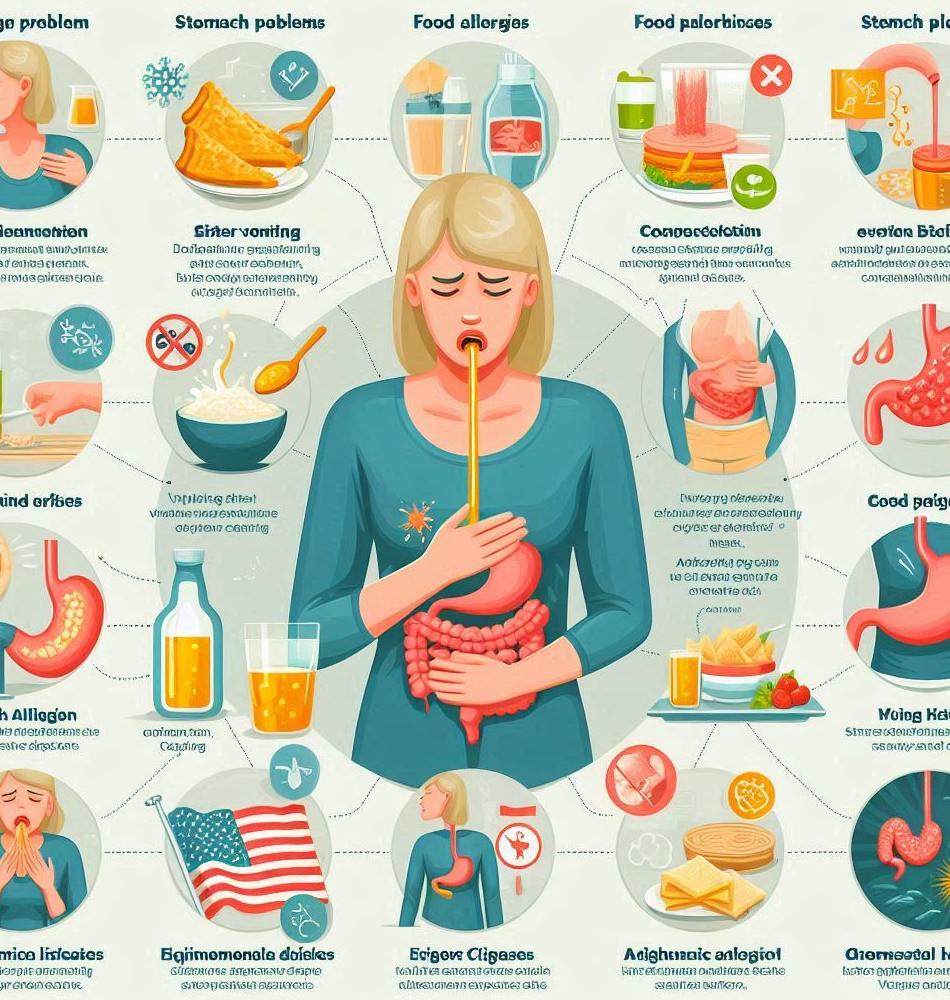Have you ever found yourself enjoying a delightful meal only to be struck down moments later by the unpleasant urge to vomit? It can feel like a betrayal from your own body. Vomiting after eating is not just a minor inconvenience. It can steal your enjoyment of food, complicate your social life, and signal underlying health issues. In this article, we will explore the various reasons why you might be experiencing this troubling symptom and offer some insights on how to address it.
What Causes Vomiting After Eating? 🤔
Vomiting is a complex process that can occur for various reasons. Understanding these triggers can help you make sense of your experiences. Below are some of the most common causes:
Gastrointestinal Disorders
One of the most common reasons for post-meal vomiting is a gastrointestinal disorder. Some of these include:
- Gastroesophageal reflux disease (GERD)- Gastritis- Peptic ulcers- Inflammatory bowel disease (IBD)Gastroesophageal Reflux Disease (GERD)
GERD occurs when stomach acid flows back into the esophagus, causing irritation and discomfort. This can lead to symptoms like heartburn, regurgitation, and in some cases, vomiting.
Gastritis and Peptic Ulcers
Both gastritis and peptic ulcers involve inflammation of the stomach lining. When food enters the stomach, it can exacerbate the irritation, leading to nausea and vomiting.
Inflammatory Bowel Disease (IBD)
Conditions like Crohn's disease and ulcerative colitis can affect your gastrointestinal tract, causing symptoms that include abdominal pain and vomiting after meals.
Food Intolerance and Allergies
In some cases, your body may react negatively to specific foods.
- Lactose intolerance- Gluten sensitivity- Food allergiesLactose Intolerance
If you lack the enzyme lactase, consuming dairy products can lead to gastrointestinal distress and vomiting.
Gluten Sensitivity
Similarly, individuals who are sensitive to gluten may experience reactions that include digestive issues and the urge to vomit after consuming gluten-containing foods.
Food Allergies
Food allergies can trigger severe reactions, including vomiting, hives, or even anaphylaxis. Common allergens include nuts, shellfish, and eggs.
Overeating and Eating Too Quickly
Sometimes, the simple act of overeating or eating too fast can lead to discomfort and subsequent vomiting. Here’s how:
- Eating large portions- Not chewing food properly- Consuming food while distractedEating Large Portions
When you overload your stomach, it can create pressure that pushes food back up the esophagus, causing discomfort and vomiting.
Not Chewing Food Properly
Failing to chew your food adequately can make it harder to digest, leading to feelings of fullness and nausea.
Stress and Anxiety
It may come as a surprise, but psychological factors can also play a significant role in gastrointestinal health. Stress and anxiety can lead to nausea and vomiting after meals. Some triggers include:
- Work-related stress- Social anxiety- Emotional eatingWork-Related Stress
High-pressure work situations can contribute to feelings of distress, which may manifest physically.
Social Anxiety
For individuals with social anxiety disorder, eating in crowded or unfamiliar settings can lead to overwhelming nerves, resulting in nausea.
When to Seek Medical Attention? ⚠️
If you are experiencing vomiting after eating regularly, it is essential to consult your healthcare provider. You should seek medical attention if you observe:
- Blood in vomit- Severe abdominal pain- Unexplained weight loss- Persistent vomiting lasting more than 24 hoursDiagnostic Tests and Treatments
Your doctor may recommend various tests to determine the root cause of your symptoms. Understanding these options can prepare you for your visit:
- Endoscopy- Ultrasound- Blood testsEndoscopy
In this procedure, a thin tube with a camera is inserted into your digestive tract, allowing doctors to observe any abnormalities.
Ultrasound
Ultrasound imaging can help identify physical blockages or structural issues within the abdomen.
Blood Tests
Tests can evaluate your overall health and check for signs of infections or allergies.
What Are Some Home Remedies? 🌿
While consulting with a healthcare provider is essential for persistent issues, some home remedies could provide relief:
- Ginger tea- Peppermint- Light, bland foodsGinger Tea
Ginger has been shown to help alleviate nausea. A warm cup of ginger tea may settle your stomach.
Peppermint
Peppermint can have soothing effects on the stomach muscles, potentially reducing feelings of nausea.
Light, Bland Foods
Sticking to bland foods like crackers or rice can help. These foods are easier for your stomach to process.
Frequently Asked Questions ❓
- Why do I vomit only certain foods?- Could my medications be causing this symptom?- Is it normal to vomit after every meal?- What lifestyle changes can I make to reduce vomiting?- Are there any specific diets for people who vomit after eating?Conclusion 🌟
Vomiting after eating can be a perplexing and distressing experience. Identifying the underlying cause is crucial for finding an effective solution. Whether it is due to a gastrointestinal disorder, food intolerance, stress, or other factors, knowing the source of the problem can help you take appropriate action. In cases where home remedies fail to provide relief, do not hesitate to consult a healthcare professional. Remember, your well-being is paramount, and pinpointing your body's signals can lead to a happier, healthier relationship with food.

